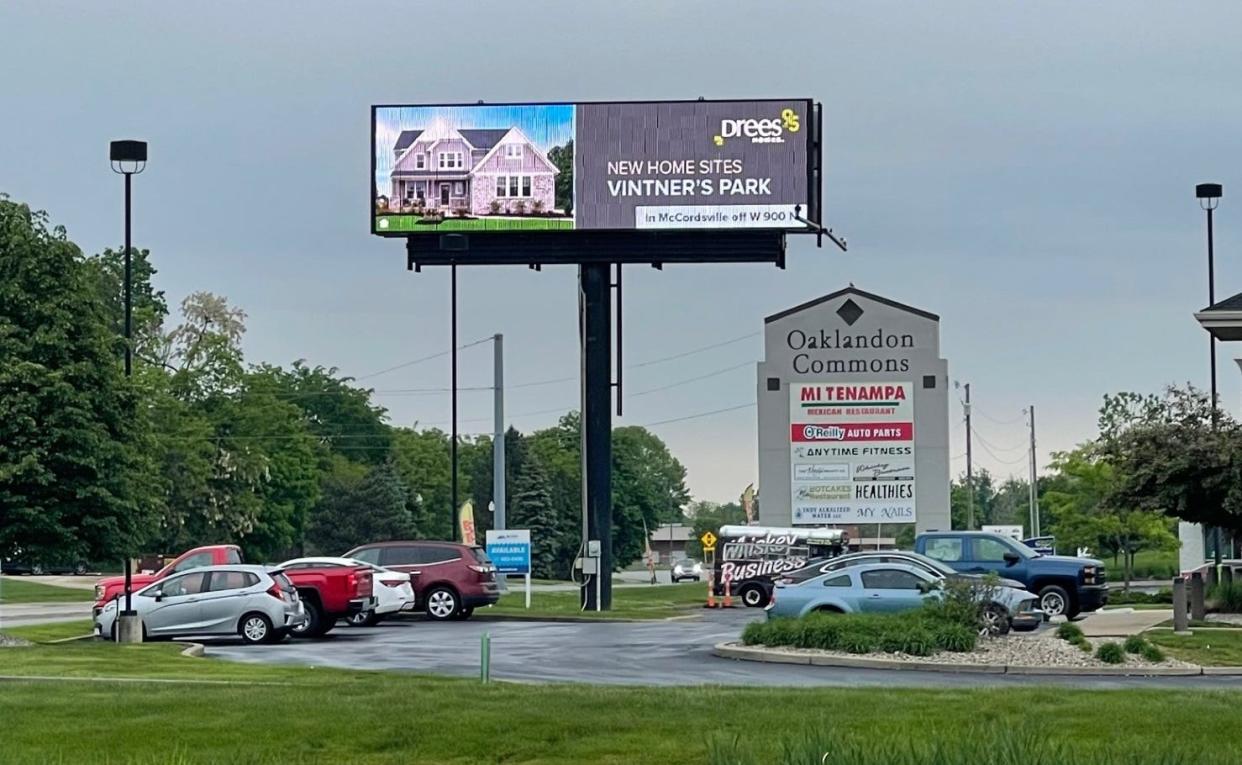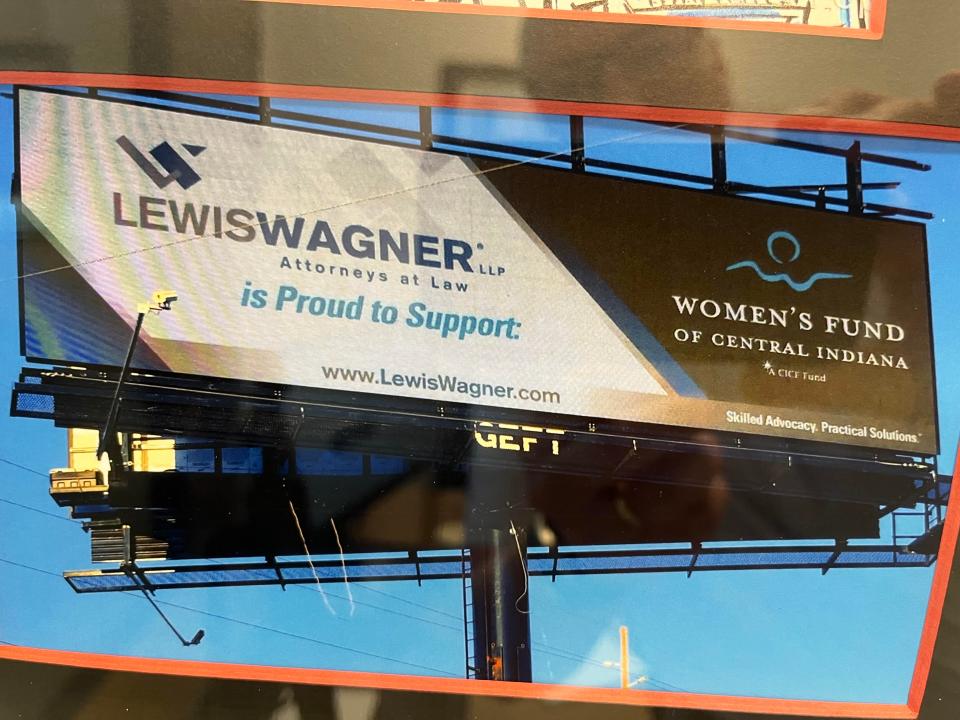Billboard company said Monroe County's laws violated First Amendment. A judge agreed.

A billboard company that wanted to erect a 50-foot-tall electric sign along Interstate 69 alleged in a lawsuit Monroe County’s zoning laws violated the First Amendment. In a 2021 ruling, a judge agreed. The county changed its zoning laws, but the company said that’s not enough. Now the case has an outside chance of being heard by the U.S. Supreme Court.
Indianapolis billboard company GEFT, which filed the suit, had leased part of a property at 2500 W. Industrial Park Drive, in northwest Bloomington, to put up the electric billboard. However, the sign would have been too tall, too large and not set back far enough from the interstate to be allowed in Monroe County.
The sign did not comply with other rules, and the company sought exceptions, or variances, from the Monroe County Board of Zoning Appeals. When that board rejected the company’s request, the company filed suit in District Court in Indianapolis, alleging the county’s sign standards contain unconstitutional, content-based regulation.
The district court judge agreed, and threw out parts of the local laws.

GEFT’s attorney, A. Richard M. Blaiklock, managing partner with Lewis Wagner in Indianapolis, said recently the suit forced Monroe County to change some of its laws because they were unconstitutional.
“Until we filed this lawsuit, Monroe County was in violation of the First Amendment,” he said.
Caren Pollack, of Pollack Law, said while a judge invalidated parts of Monroe County’s laws, the sign company still can't put its billboard along I-69.
The parties signed an agreement last week that — barring intervention from the U.S. Supreme Court — essentially ends the legal fight.
Jeff Lee, founder and owner of GEFT, said unless the land's highest court intervenes, "We cannot put up a sign right now without risking enforcement."
If the U.S. Supreme Court takes up the case and rules in GEFT’s favor, the company can refile the lawsuit. If the court rejects the case, the matter would be over — except for the question of attorney fees.
Blaiklock said it’s difficult to say whether the U.S. Supreme Court would take up the case, though Pollack said the odds are “very slim.”
Why does Monroe County prohibit certain billboards?

In a hearing before the board of zoning appeals on March 6, 2019, then-county planning director Larry Wilson told the BZA the county prohibits digital billboards and also does not allow so-called off-premise signs that advertise for a product or service that is not available where the sign is placed. In other words, a gas station next to the interstate can put a billboard on its property to advertise to potential customers on the interstate — but it cannot do so on a rented farm field a few miles away.
Wilson said the county enacted the prohibition for such signs in the late 1990s because they “detract from the natural views, cause additional light pollution and further impact existing residences and wildlife."
The planning department said in its report that GEFT’s request for variances for an electronic billboard along I-69 should be rejected for reasons including that it “would be injurious to the public health, safety and general welfare of the community” and may affect use and value of adjacent property.
GEFT argued the rules are problematic because they make a distinction between the type of speech the sign conveys, making the law unconstitutional. Blaiklock said that’s particularly problematic for electronic signs, because about a third of the time, GEFT’s signs display noncommercial speech, including political ads and advocacy for nonprofits.
In its lawsuit, GEFT said the county’s sign standards require permits for some signs, but not for others, such as “design features which do not incorporate advertising or identification” and “temporary noncommercial signs.”
GEFT also said the county’s permitting and variance schemes were impermissible prior restraints on speech. Prior restraint means a government action — in this case the requirement for a permit — that prohibits speech before it happens.
How did the courts decide?
In a ruling issued on Aug. 10, 2021, Judge James R. Sweeney II agreed, at least in part, with the billboard company, saying some of the exemptions the county has in its zoning regulation are “constitutionally infirm.”
“A wordless mosaic would be exempted from the permit requirement, but a mosaic that identifies a community center's name would need a permit. Yet one is not inherently less distracting to drivers or prettier than the other by nature of such identification or lack thereof,” the judge wrote.
The judge also agreed with GEFT that the variance process conferred “unbridled discretion” on the county.
The judge struck those parts of the local code.
County Attorney Dave Schilling said the county updated its local laws shortly after the judge’s ruling.
Sweeney II did not agree with the company on the off-premises sign prohibition, because the county has “substantial interest in traffic safety and aesthetics.” In addition, he said, courts have found that “commercial speech is a lower value speech category in First Amendment jurisprudence.”
GEFT requested the judge throw out the entire ordinance because parts of it were unconstitutional, but the judge rejected that argument, saying he could simply invalidate the offending passages.
If the judge had agreed to GEFT’s request, the company would have been able to install its billboard and could have collected damages from the county.
The judge noted that even though he invalidated parts of the local ordinance, GEFT still would not be allowed to put up its sign because some parts of the ordinance, such as the prohibition against off-premise advertising, would still require GEFT to obtain some variances.
Appeals court partially sides with county
Neither GEFT, nor the county, was especially happy with the ruling, and both appealed, with GEFT asking the appeals court to throw out the entire sign ordinance.
The appeals court said it could not take that step, because the county had by that point deleted the passages that violated the First Amendment.
Freedom of speech: Why Monroe County prosecutor, radio station are involved in lawsuit involving abortion
The county has “mooted” GEFT’s argument, the judges wrote, because the offending provisions “no longer exist” — though they noted GEFT still may be able to seek monetary damages as the county cannot dodge punishment simply by repealing an unconstitutional regulation.
The appeals court did overturn parts of the lower court’s ruling in the county’s favor. For example, the appeals court judges said the county’s variance procedure relating to sign restrictions such as height, size and digital content, could remain because “the censorship risk is low.”
That’s in part, the judges wrote, because the county “permits ample alternatives for speech, including displays of messages on signs. GEFT could today erect a nondigital billboard within the required size, height and setback limitations,” the judges wrote.
“In the end we are convinced that Monroe County’s variance provision does not give so much discretion to the Board of Zoning Appeals that it violates the First Amendment. So we reverse the district court’s determination that the variance provision is unconstitutional,” the judges wrote.
The county did not appeal the district court judge’s ruling that the permitting scheme was unconstitutional.
That means people who want to put up signs today can do so without a permit — as long as they follow the county’s size, height and setback restrictions as well as prohibitions against digital signage and off-premise advertisements. If the signs people put up don’t comply with local rules, the county will let them know, Pollack said.
Lee, an Indiana native who finds spots for billboards in Indiana, Michigan and Illinois, and subcontracts the sign manufacture and installation, said he has filed about half a dozen similar cases in other parts of the state, including Indianapolis, Fishers and Westfield.
Blaiklock said other communities, too, have had to change their laws as a result of the suits, and in some cases, GEFT also has been able to put up signs.
Lee said almost all of his suits have proven that some local laws violate the U.S. Constitution, and at a bare minimum, the county or municipality has had to pay his legal fees.
Blaiklock said GEFT’s attorney fees are “well more than $10,000,” and he said the county should have to pay those, given its laws were unconstitutional. He said he expects a judge to rule on that matter within six months.
The county legal department could not immediately say how much it paid Pollack to handle the case.
Boris Ladwig can be reached at bladwig@heraldt.com.
This article originally appeared on The Herald-Times: Despite lawsuit electronic billboard won't be allowed in Monroe County

